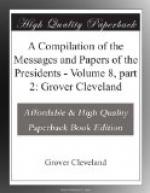The bill before me does not enjoin upon the President the abrogation of the entire Burlingame treaty, much less of the principal treaty of which it is made the supplement. As the power of modifying an existing treaty, whether by adding or striking out provisions, is a part of the treaty-making power under the Constitution, its exercise is not competent for Congress, nor would the assent of China to this partial abrogation of the treaty make the action of Congress in thus procuring an amendment of a treaty a competent exercise of authority under the Constitution. The importance, however, of this special consideration seems superseded by the principle that a denunciation of a part of a treaty not made by the terms of the treaty itself separable from the rest is a denunciation of the whole treaty. As the other high contracting party has entered into no treaty obligations except such as include the part denounced, the denunciation by one party of the part necessarily liberates the other party from the whole treaty.
I am convinced that, whatever urgency might in any quarter or by any interest be supposed to require an instant suppression of further immigration from China, no reasons can require the immediate withdrawal of our treaty protection of the Chinese already in this country, and no circumstances can tolerate an exposure of our citizens in China, merchants or missionaries, to the consequences of so sudden an abrogation of their treaty protection. Fortunately, however, the actual recession in the flow of the emigration from China to the Pacific Coast, shown by trustworthy statistics, relieves us from any apprehension that the treatment of the subject in the proper course of diplomatic negotiations will introduce any new features of discontent or disturbance among the communities directly affected. Were such delay fraught with more inconveniences than have ever been suggested by the interests most earnest in promoting this legislation, I can not but regard the summary disturbance of our existing treaties with China as greatly more inconvenient to much wider and more permanent interests of the country.
I have no occasion to insist upon the more general considerations of interest and duty which sacredly guard the faith of the nation, in whatever form of obligation it may have been given. These sentiments animate the deliberations of Congress and pervade the minds of our whole people. Our history gives little occasion for any reproach in this regard; and in asking the renewed attention of Congress to this bill I am persuaded that their action will maintain the public duty and the public honor.
R.B. HAYES.
PROCLAMATION.
BY THE PRESIDENT OF THE UNITED STATES OF AMERICA.
A PROCLAMATION.
Whereas the final adjournment of the Forty-fifth Congress without making the usual and necessary appropriations for the legislative, executive, and judicial expenses of the Government for the fiscal year ending June 30, 1880, and without making the usual and necessary appropriations for the support of the Army for the same fiscal year, presents an extraordinary occasion requiring the President to exercise the power vested in him by the Constitution to convene the Houses of Congress in anticipation of the day fixed by law for their next meeting:




